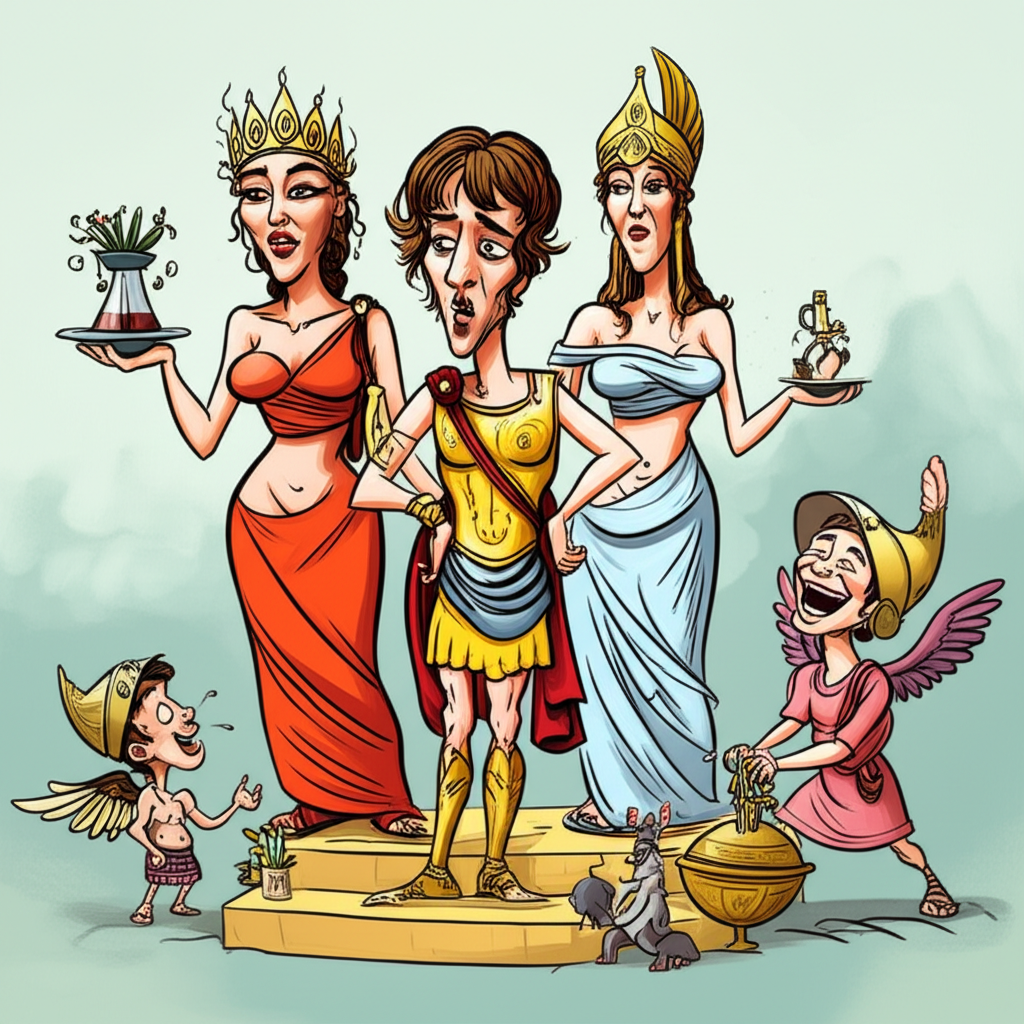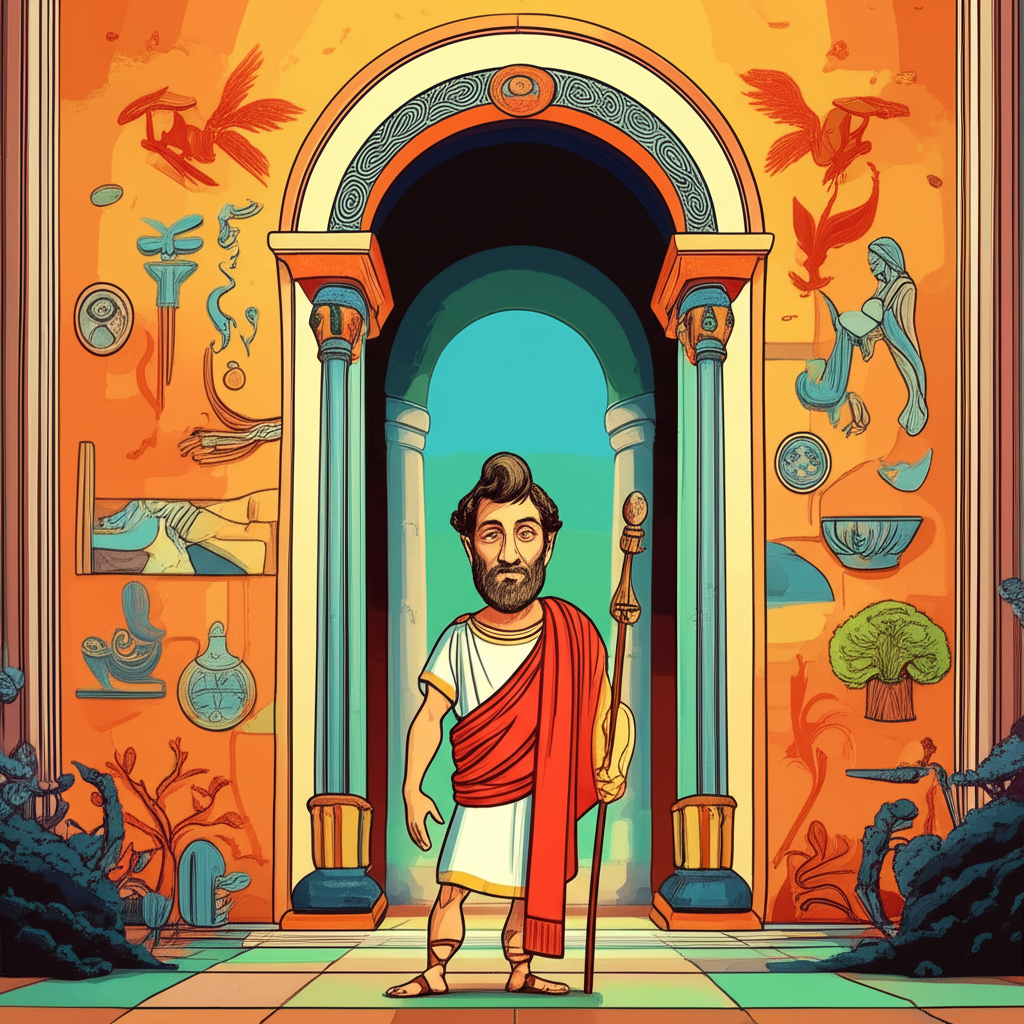
The tapestry of human history is woven with countless threads of stories, some recounting verifiable events, others spun from the vibrant loom of imagination. Among these latter threads are the myths and legends, powerful narratives that offered ancient peoples a framework for understanding their world. One such enduring tale, originating from the rich cultural landscape of Ancient Greece, is the story of the Judgment of Paris, inextricably linked to the potent concept of prophecy. This is a traditional story, told by the ancient Greeks, and serves as a testament to their storytelling prowess and worldview, not as a factual account or a basis for belief.
Origins and Cultural Background: A World Shaped by Gods and Omens
The society that birthed the myth of the Judgment of Paris was the Hellenic world, a civilization flourishing in the Mediterranean region millennia ago. It was an era characterized by city-states, monumental architecture, philosophical inquiry, and a profound reverence for a complex pantheon of anthropomorphic deities. For the ancient Greeks, the world was not merely a realm of human endeavor but a stage upon which gods, goddesses, and demigods played pivotal roles, often interfering directly in mortal affairs.
People of that time viewed their existence through a lens deeply colored by divine influence and the unyielding hand of fate. They believed that the gods resided on Mount Olympus, possessing immense power, human-like emotions, and a penchant for both benevolence and vengeance. Prophecies, omens, and oracles were integral to their decision-making, offering glimpses into the future or divine counsel. The most famous of these prophetic centers was the Oracle of Delphi, where the priestess Pythia, believed to be a mouthpiece for the god Apollo, delivered often cryptic pronouncements that guided kings, generals, and ordinary citizens alike. Such pronouncements, whether from Delphi or local seers, were taken with utmost seriousness, believed to reveal the will of the gods or the inexorable path of destiny.
Figures of Fate: Paris and the Olympian Goddesses
At the heart of this particular myth stands Paris, a Trojan prince whose life was marked by a chilling prophecy from its very beginning. Son of King Priam and Queen Hecuba of Troy, Paris was initially described as exceptionally beautiful, a trait that would paradoxically lead to his family’s ruin. Prior to his birth, Queen Hecuba had a terrifying dream: she gave birth not to a child, but to a flaming torch that consumed the city of Troy. Interpreted by seers as a prophecy that her son would cause the destruction of Troy, the royal couple, in a desperate attempt to avert fate, ordered the infant Paris to be abandoned on Mount Ida. Yet, destiny proved resilient; Paris was found and raised by shepherds, growing into a handsome, skilled, and gentle young man, unaware of his royal heritage or the grim prophecy that shadowed him.
The other central figures are three powerful Olympian goddesses: Hera, queen of the gods, often associated with marriage, family, and sovereignty; Athena, goddess of wisdom, strategic warfare, and crafts; and Aphrodite, goddess of love, beauty, and desire. These divine beings, while revered, were also depicted with very human flaws: vanity, jealousy, and a competitive spirit. Their symbolic attributes—Hera’s scepter and diadem representing power, Athena’s helmet and shield signifying strategic intellect, and Aphrodite’s doves and roses embodying irresistible allure—were not meant to be worshipped, but to illustrate the various facets of power, wisdom, and passion that governed both the divine and mortal realms in Greek thought.
The Spark of Discord: A Narrative of Choice and Consequence
The stage for the fateful judgment was set during a grand wedding feast, that of the mortal Peleus and the sea nymph Thetis, parents of the hero Achilles. All the gods and goddesses were invited, save one: Eris, the goddess of discord. Outraged by this snub, Eris sought her revenge. During the celebration, she tossed a golden apple inscribed with the words "To the Fairest" among the assembled deities. Immediately, Hera, Athena, and Aphrodite each claimed the apple, believing themselves to be the rightful recipient.
The dispute quickly escalated, threatening to shatter the Olympian harmony. Zeus, king of the gods, wisely refused to choose, knowing any decision would incur the wrath of two powerful goddesses. Instead, he decreed that the decision should fall to a mortal, one known for his discerning eye and impartiality. That mortal was Paris, the shepherd prince of Mount Ida.
Hermes, the messenger god, escorted the three resplendent goddesses to Mount Ida, where they found Paris tending his flocks. The goddesses presented their cases, each attempting to sway Paris with an irresistible bribe. Hera, majestic and regal, promised Paris immense political power, offering him dominion over all of Asia and a life of unparalleled kingship. Athena, clad in her battle attire, appealed to his ambition for glory, pledging to grant him wisdom, invincibility in battle, and the renown of the greatest warrior. Finally, Aphrodite, shimmering with ethereal beauty, offered him the most alluring prize: the love of the most beautiful woman in the world, Helen of Sparta, already married to King Menelaus.
Paris, faced with these monumental choices—power, wisdom, or love—pondered deeply. His decision was not one of divine inspiration or moral righteousness, but a deeply human one, driven by desire. He chose Aphrodite. He awarded her the golden apple, sealing his own fate and, unbeknownst to him, initiating a chain of events that would plunge the Greek and Trojan worlds into a devastating conflict. This choice, stemming from the prophecy that foretold his role in Troy’s downfall, set the ancient world on a trajectory towards the legendary Trojan War, a conflict born from a single mortal’s judgment and a goddess’s promise.
Symbolism and Meaning: Reflecting Ancient Concerns
To the ancient Greeks, the Judgment of Paris was far more than a simple anecdote; it was a potent narrative rich with symbolism. It explored the profound concepts of fate versus free will, suggesting that even seemingly small, personal choices could have monumental, predetermined consequences, echoing the initial prophecy about Paris’s birth. Paris’s decision, despite the dire prophecy, underscored the human inclination to pursue personal desires, often at great cost.
The story also represented the destructive power of desire and beauty, particularly in Aphrodite’s promise of Helen, which ignited a war that ravaged nations. It was a cautionary tale about the perils of vanity and the corrupting influence of personal gain over wisdom or power, as Paris valued love over the more practical offerings. Furthermore, it highlighted the prevalent belief in divine intervention in human affairs, where the whims and rivalries of the gods could directly impact mortal lives, shaping their destinies and determining the course of history. The ambiguity of prophecies, whether from Delphi or other seers, also resonated; warnings could be given, but human actions often led to their fulfillment, sometimes through attempts to avert them.
Modern Perspectives: Echoes in Culture and Thought
Centuries after its conception, the myth of the Judgment of Paris continues to resonate in the modern world, not as a belief system, but as a rich source of cultural, historical, and educational understanding. It has inspired countless works of art, from classical paintings by Rubens and Watteau, depicting the goddesses and Paris in their idyllic setting, to sculptures and operatic adaptations. In literature, while Homer’s Iliad focuses on the war itself, the Judgment of Paris serves as its foundational inciting incident, a pivotal moment in the epic cycle.
Today, elements of the myth are found in various forms of media. Modern movies, such as Troy, and numerous video games often reference or adapt aspects of the Trojan War saga, inherently drawing from the Judgment. In cultural studies, the myth is analyzed for its archetypal characters, its exploration of human nature, and its role in shaping Western literary traditions. It remains a powerful metaphor for difficult choices, the allure of forbidden desires, and the far-reaching consequences of individual decisions, serving as a timeless narrative that probes the complexities of human morality and destiny.
Conclusion: A Legacy of Imagination and Heritage
The Judgment of Paris, interwoven with the ancient Greek concept of prophecy, stands as a vibrant testament to the storytelling tradition of a bygone era. It is a captivating myth, not a factual account, and certainly not something to be believed, worshipped, or practiced. Rather, it is a crucial piece of our shared global cultural heritage, offering insights into the worldview, fears, and aspirations of the ancient Greeks.
As Muslims, we firmly recognize that only Allah is the true Creator and Sustainer of all existence, and that all power, wisdom, and guidance ultimately emanate from Him alone. The gods and prophecies of ancient myths are products of human imagination, reflecting a time when people sought to explain the mysteries of the universe through narrative. This story, like countless others from diverse cultures, reminds us of the enduring power of human imagination, the timeless art of storytelling, and our collective journey to understand the world around us, whether through verifiable fact or the rich tapestry of myth.




